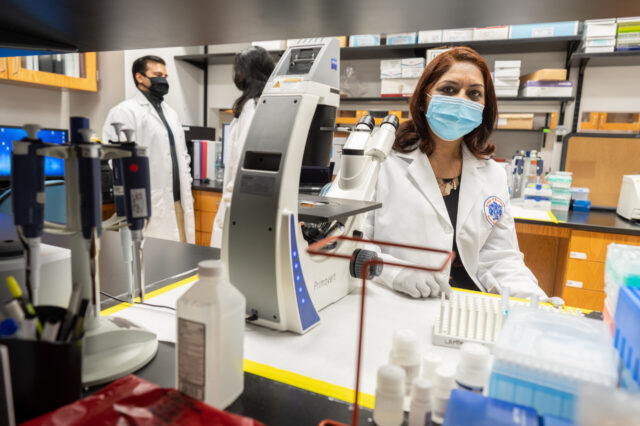UF researchers create method to predict leukemia drug complications

A team of University of Florida researchers has created a way to use genetics to predict leukemia patients’ risk for complications from chemotherapy drug toxicity.
The team, led by Jatinder Lamba, Ph.D., associate dean of research and graduate education and a professor in the UF College of Pharmacy, made a comprehensive pharmacogenomics evaluation of key genes involved in the pathways of several commonly used drugs to treat acute lymphoblastic leukemia, or ALL, the most common type of leukemia in children. The study, which assessed toxicity data and DNA samples from 75 patients treated at UF Health, was published March 23 in the journal JCO Precision Oncology.
Chemotherapy drug toxicity refers to adverse side effects of chemotherapy treatment, such as heart or nerve damage, which can be serious or life-threatening. Survivors of ALL have a higher risk of chronic health conditions and early death; one large-scale study found nearly all survivors of ALL had a least one chronic health condition and the conditions were so severe the actual burden was almost double that of community controls.
“The survival rates for this type of leukemia are generally good, but one of the biggest clinical challenges for these patients is toxicity that affects their quality of life because of the intensive chemotherapy drugs they’re given,” said Lamba, the Frank A. Duckworth Eminent Scholar Chair in the College of Pharmacy and a member of the UF Health Cancer Center’s Cancer Therapeutics & Host Response research program. “Our goal was to build a genetic toxicity score that can predict whether a patient has a higher or lower risk of toxicity when taking these medications.”
Everyone’s genetic makeup is different and patients respond differently to therapeutic drugs. That makes it hard for clinicians to know what to expect. Chemotherapy complications can cause treatment to be delayed or paused at a time when stopping the cancer is a priority.
Lamba’s team focused on toxicities in several categories, such as gastrointestinal, neurological and infections that caused hospital stays. The researchers considered toxicities that were seen within 100 days of beginning treatment, a key period for cancer remission.
The team found a significant association between variations in genes that play a major role in toxicities. To improve the value of the prediction tool, the team used artificial intelligence to create pairs of three genetic variations. The goal was to identify the combination of genetic variations most likely to predict a given toxicity. The researchers found the combination models were significant predictors of the most common toxicities during leukemia treatment.
Lamba hopes clinicians will try the scoring tool so it can be used to preemptively monitor patients and design interventions to improve patients’ quality of life.
“With this score in a patient’s medical record, when the clinician is prescribing a particular chemotherapy, they will know the patient’s risk of getting life-threatening toxicities and be able to make informed decisions,” Lamba said. “They can watch the patient more closely or modify the drug dosages, or they can preemptively enhance supportive therapy to prevent the toxicity.”
The new research advances Lamba’s work to bring a precision medicine approach to treating childhood leukemia. Previously, Lamba’s team developed a patient-specific polygenic score to predict the effectiveness of the chemotherapy drug cytarabine to treat acute myeloid leukemia.
Media contact: Leah Buletti, lbuletti@ufl.edu or 352-265-9429
About the author
